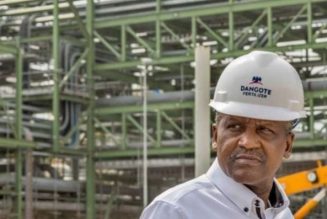Technology
Engineer deploys AI to make Kenyan flower farms smarter
Monday February 06 2023
Jasper Simpkins, the founder of Lima Labs, an artificial intelligence system that monitors plants in real-time. FILE PHOTO | POOL
When Jasper Simpkins talks about it, he describes it as an evolution. The transition led to the founding of Lima Labs, a Kenyan-based artificial intelligence (AI) technology company that provides Kenyan farmers with a machine vision system making their farms smarter and more predictable.
Lima Labs—the idea—was conceived in Berlin, Germany while Mr Simpkins and his partner Ghaith Limam worked in a diagnostic engineering company.
Jasper who is now the chief executive at Lima Labs is trained in analytical engineering and data science while Mr Limam has training in AI and machine learning.
“We were tasked with analysing hundreds of biological samples for the food safety centre. It took us two and a half years to build a microscope, both the hardware and its components and create the software to make it work. We saw the power that AI was having in automating data collection for the agriculture sector, and we asked ourselves what else we could point cameras at to automatically collect data through AI that is valuable for businesses and users. Then we flew to Kenya to set up. From observing micro-organisms to observing growing and fully grown plants. That is an act of evolution,” Mr Simpkins says.
They set out to build advanced algorithms with a canvas approach for the whole agriculture sector. Soon they retrained their focus on plants.
“When you set out to start, you have a certain skill set. But you don’t know the problems you will solve until you find them. So, Lima iterated solutions in our system for the whole sector, we didn’t expect that we would have a bias in plants and specifically so, flowers. But flowers are beautiful to look at, everyone loves to look at flowers,” he explains gaudily.
One may ask, why Kenya? And Mr Simpkins is easy to let it out. He grew up in Nanyuki, among the horticultural farms.
Read: Why AI ChatGPT Software is a big deal
He had interacted with various players in the horticultural sector and noticed that farmers were struggling not just with data collection, but also with the inaccuracy in the collected data.
These inaccuracies, he surmises, affect the decision-making processes of not just the farms but the entire industry and may lead to huge losses.
He invested 5,000 euros (Sh680,145) in their start-up which they used in building their prototype. From there they had firms interested in their project and they were introduced to three Kenyan Mo Angels ambassadors who got on board and injected a further 150,000 euros (Sh20.4 million) into the business.
Then a German venture capital firm came in and added to their basket 1.4 million euros (Sh190.4 million) as a seed investment fund. They officially started operations in April 2020.
The Lima system works in tiers. The first is the Lima Asili, which is the imaging stage where Lima Internet of Things (IoT) cameras monitor plants in real time and capture required footage.
The second tire is the Lima Engine. The AI bit learns how crops grow and can relay important information to the next stage in the process.
The last tire of this facet is the Lima Dashboard which displays the data collected from the ground on demand and in real-time.
The dashboard displays photos of the plants, headcount, and other crucial data that enhance decision-making.
They have integrated on-farm sensors that detect humidity, temperature, and other environmental conditions so that the tool can relay better data to the farmer.
Through this Mr Simpkins says, the farmer has a good standing in predicting the performance of the crop, the expected day of harvest and the expected returns since the farmer has an exact headcount of the crop in the field.
“Our focus is to use AI to enhance better decision-making in the farms through a data-driven approach as opposed to reliance on traditional lengthy learning cycle that may present significant errors, especially at the data collection and entry points,” Mr Simpkins says.
Lima Labs works with 53 large commercial farms and 60 individuals across four areas, Nanyuki, Naivasha, Kericho, and Timau, each experiencing a tailor-made system.
Young workers of Lima Labs, an AI company that helps farmers monitor their farms. FILE PHOTO | POOL
“One thing you must appreciate is that we are not a team of agronomists and farmers, we are a team of engineers and data scientists. We can’t do without the farmers in the room. We build systems that suit each farmer’s needs,” he says.
Mr Simpkins believes Lima’s biggest value add is its ability to project and predict. What has been your production over time and what is coming up? This is a question the system seeks to answer.
The AI has also been trained to look at market trends over time. Prices, supply, and demand. This is important because sharp volatility in any of these might lead to losses.
At any stage of the crop’s growth, the farmer is informed of the crop’s status and will therefore have the right intervention mechanism to maximize the expected returns.
Payment model
The system is subscription-based and the farmers use Lima’s platform to access it while they supply the hardware used on the ground.
They offer training to the farmer on how to navigate the system and what to make of the data they retrieve from it.
The thing that makes Mr Simpkins and the team at Lima proud is the uptake of their product. “I am amazed by the uptake. When I stand back and see what they have achieved through this product, I am so happy,” he says.
The challenge they have faced in their business is having farmers trust that a camera and the whole ensemble that is their system can do what has been done by humans for a long time.
That and having to explain that the system is not built to replace human input but on the contrary to enhance it.
On future plans, Lima Labs is looking at getting into other markets, their primal focus being Ethiopia, Ecuador, and Poland.
Read: How AI is changing education Sector
And just before he turns 30, what would he say is his business philosophy? Enjoy the process. Learn from it and grow.
Outside Lima Labs, Mr Simpkins keeps camels in Naivasha for milk production. “Everyone should taste camel milk cappuccino and I make it possible with my farm,” he says.









